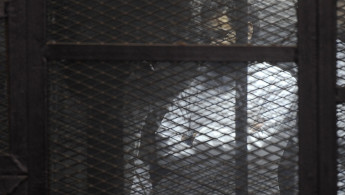Egyptian prosecutors deny accusations by Alaa Abdel-Fattah’s family that they were prohibited from visits
The Egyptian prosecutor general’s office on Thursday evening denied accusations by the family of jailed activist Alaa Abdel-Fattah that he had been prohibited family visits since July 23.
The prominent activist is currently being held at Wadi El-Natroun correctional facility.
Earlier this week, Abdel-Fattah’s sister, Mona Seif, said that all contact with her brother had been cut off completely since his mother’s last visit on 16 July.
He has been on a hunger strike for 118 days now, consuming only 100 calories per day.
In a statement released on Facebook, the prosecutor general said that a senior prosecutor from the office’s human rights sector visited Abdel-Fattah this week at the prison to investigate his family’s accusations.
The prosecution’s statement is the first response to the family’s frequent accusations over the past months.
“The investigation revealed that the inmate underwent regular medical examinations and that he did not suffer from any medical issues and had not been unwell,” the statement read, adding that Abdel-Fattah was refusing visits voluntarily.
Abdel-Fattah’s mother, Laila Soueif, had earlier filed complaints to the prosecutor general about her being unable to contact any prison officials, since 23 July, to ensure the safety of her son.
“The medical centre director at the correctional centre confirmed that [Abdel-Fattah] enjoyed good health, and the assigned doctor has been visiting him and the rest of the inmates regularly to monitor their health.
"The prisoner had never sustained any health issues or complained of any symptoms,” the statement added.
The family wrote on their official Facebook page “Free Alaa” that the prosecution’s statement was “a proof of life.”
According to the prosecution, after answering some of the investigator’s questions, Abdel-Fattah refused to continue.
Abdel-Fattah holds British citizenship and asked to be put in touch with a British consulate official but the prosecution said that he did not present evidence that he held British nationality.
However, Abdel-Fattah’s aunt, award-winning British-Egyptian novelist Ahdaf Soueif questioned the kind of “evidence a prisoner could hold in his cell to prove citizenship.”
“Every item that comes up, that is scrutinised, scanned and passed upwards to be authorised. What could he hold?" she asked rhetorically on her Facebook page.
The prosecutor also said he had physically examined Abdel-Fattah, claiming his body bore no signs of injury or torture.
“This is some investigation - it finds no physical signs of a beating inflicted two years and nine months after his family reported he had been assaulted in prison,” Ahdaf Soueif cynically retorted.
Abdel-Fattah was sentenced in December last year to five years in prison after he was convicted along with two others of "broadcasting false news” among other charges.
He acquired UK citizenship in April this year from inside prison, through his British-born mother.





 Follow the Middle East's top stories in English at The New Arab on Google News
Follow the Middle East's top stories in English at The New Arab on Google News


